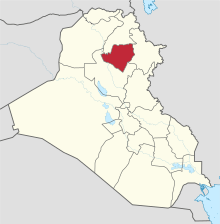Kirkuk Governorate
| Kirkuk Governorate محافظة كركوك (Arabic) پارێزگای کەرکووک (Kurdish) | |
|---|---|
| Governorate | |
 | |
| Coordinates: 35°22′N 44°8′E / 35.367°N 44.133°ECoordinates: 35°22′N 44°8′E / 35.367°N 44.133°E | |
| Country |
|
| Capital | Kirkuk |
| Governor | Najmiddin Karim |
| Area | |
| • Total | 9,679 km2 (3,737 sq mi) |
| Population (2011) | |
| • Total | 1,395,614 |
Kirkuk Governorate (Arabic: محافظة كركوك Muḥāfaẓat Karkūk, Kurdish: پارێزگای کەرکووک, Syriac: ܟܪܟ ܣܠܘܟ Karḵ Sloḵ, Turkish: Kerkük ili) or Kirkuk Province is a governorate in northern Iraq, occupied by Iraqi Kurdistan since 2014. The governorate has an area of 9,679 square kilometres (3,737 sq mi). In 2011 the estimated population was 1,395,614 people.[1] The provincial capital is the city of Kirkuk. It is divided into four districts.
From 1976 to 2006, it was named At-Ta'mim Governorate, which means "Nationalization" and refers to the national ownership of the regional oil and natural gas reserves. Prior to 1976 it had been named Kirkuk Governorate. In 2006, the name "Kirkuk Governorate" was restored.
Governorate government
- Governor: Najmiddin Karim[2]
- Deputy Governor: Rokaan Siad[3]
- Provincial Council Chairman (PCC): Hassan Touran[2]
Districts
| District | Total Population 2003 |
|---|---|
| Dibis | 34,254 |
| Daquq | 40,237 |
| Al-Hawija | 451,267 |
| Kirkuk | 662,249 |
Demographics
Kirkuk province borders were altered, the Kurdish dominated districts were added to Erbil and Sulaymaniya provinces. the Arab districts were added to Kirkuk province. Turkmen villages were added to Diyala and Salahuddin provinces.[4]
Due to the Arabization policies of the Ba'ath party the number of Arabs in official censuses increased fivefold within 40 years, however the most reliable data indicative of the ethnic breakdown of the governorate are those of the 1957 census.[5] The number of Kurds remained relatively constant from 1957 until 1977, decrease in their numbers coincides with the Arabization process in the 1990s.[6] The Turkmens were seriously affected by the Ba'ath changing Kirkuk borders their percentage fell from 21% to 7%.
Starting from 1977, 2000 Christians (Assyrians) were registered as Arabs. From the end of the Gulf War to 1999, about 11,000 Kurdish families were deported from Kirkuk.[7] Since the 2003 invasion of Iraq, 100,000 Kurds have returned to the city of Kirkuk[8] and these numbers are steadily increasing.
Many Arab families, particularly those of recent arrival have been "encouraged" by the Kurdish government to leave, including financial incentive to do so. In their place have arrived long-banished Kurds (or other Kurds), from as far away as Egypt, Turkey and the Persian Gulf countries to replace them in Kirkuk. Once again, Kirkuk is fast becoming a Kurdish-majority city, if it is not already.
| Census results for Kirkuk Governorate[5] | |||||||
| Mother tongue | 1957 | Percentage | 1977 | Percentage | 1997 | Percentage | |
|---|---|---|---|---|---|---|---|
| Arabs | 109,620 | 28.2% | 218,755 | 45% | 544,596 | 72% | |
| Kurds | 187,593 | 48.2% | 184,875 | 38% | 155,861 | 21% | |
| Turkmens | 83,371 | 21.4% | 80,347 | 17% | 50,099 | 7% | |
| Assyrians | 1,605 | 0.4% | |||||
| Jews | 123 | 0.03% | |||||
| Other | 6,545 | 1.77% | 0 | 0% | 2,189 | 0.3% | |
| Total | 388,829 | 100% | 483,977 | 100% | 752,745 | 100% | |
See also
References
- ↑ Central Organization for Statistics and Information Technology, Iraq
- 1 2 http://en.aswataliraq.info/Default.aspx?page=article_page&c=slideshow&id=141690
- ↑ http://www.blackanthem.com/News/iraqi-freedom/Photos-Operation-Lion-Victory-Celebrates-Security-Gains-in-Hawijah14572.shtml
- ↑ Dagher, Sam (25 April 2008). "Can the U.N. avert a Kirkuk border war?". CS Monitor. Retrieved August 2, 2012.
- 1 2 Anderson, Liam D.; Stansfield, Gareth R. V. (2009), Crisis in Kirkuk: The Ethnopolitics of Conflict and Compromise, University of Pennsylvania Press, p. 43, ISBN 0-8122-4176-2
- ↑ Anderson, Liam D.; Stansfield, Gareth R. V. (2009), Crisis in Kirkuk: The Ethnopolitics of Conflict and Compromise, University of Pennsylvania Press, p. 44, ISBN 0-8122-4176-2
- ↑ "An ancient tragedy". The Economist. 20 February 1999. Retrieved 22 June 2013.
- ↑ http://www.themilitant.com/2005/6912/691204.html
External links
- Iraq Inter-Agency Information & Analysis Unit Reports, Maps and Assessments of Iraq's Governorates from the UN Inter-Agency Information & Analysis Unit
 |
Arbil Governorate |  | ||
| |
Sulaymaniyah Governorate | |||
| ||||
| | ||||
| Salah ad Din Governorate |